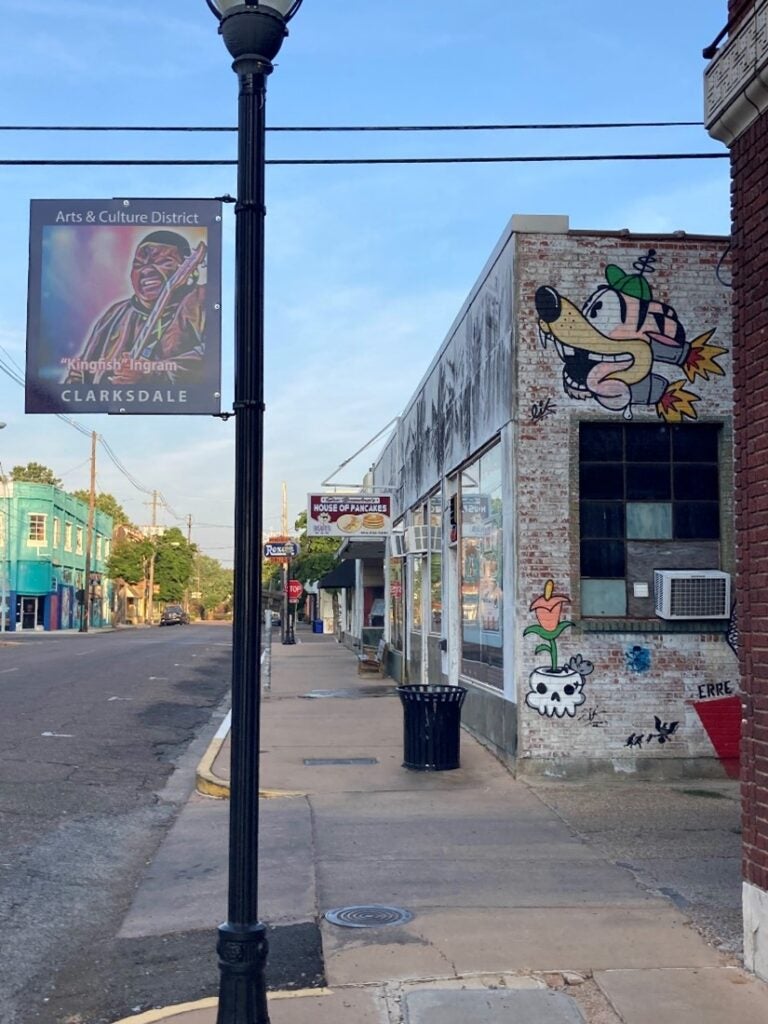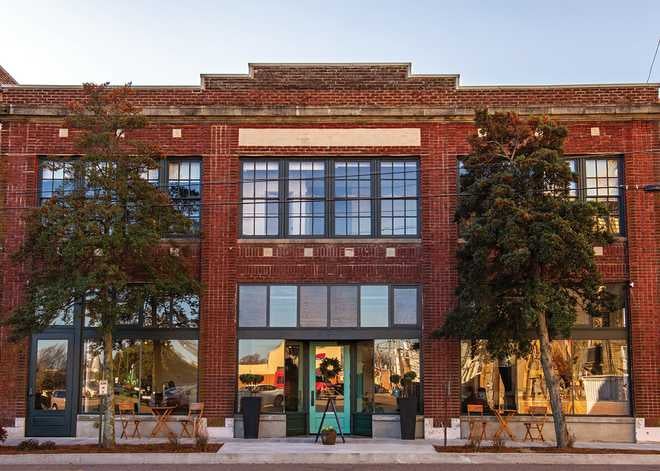Pictured above: Located in downtown Clarksdale MS, the Travelers Hotel employs artists in exchange for free housing. Photo courtesy of Ann Williams.
Mississippi has reached a record ranking and is no longer last in the nation for K-12 achievement, announced Tom Pittman at the recent opening of this year’s Delta Directions Regional Forum. The Forum takes place annually in Clarksdale, MS and Tom, now serving as President Emeritus of the Community Foundation of Northwest Mississippi has been involved with Delta Directions for over a decade.
If there is anyone who is familiar with the prevailing narrative about Mississippi, Tom should know. That is why it is such a celebration when Mississippi inches forward and is no longer #50 (or #1 at being the worst). Tom is one of many advocates and change makers we have had the privilege to work with over the last few years of Harvard Chan’s involvement with the Delta Directions Consortium. The Consortium is an interdisciplinary network of individuals, academic institutions, non-profit organizations, and foundations that work together to create positive social change in the Mississippi Delta Region by improving public health and promoting economic development.

Through the Mississippi Delta Partnership in Public Health and the Winokur Fellowship in Public Health at Harvard Chan, faculty, staff and students have been partnering with community-based and philanthropic organizations in Mississippi. One such organization is the Children’s Foundation of Mississippi (CFM), a research and policy-oriented think tank that advocates for the wellbeing of children in Mississippi. The focus on children is what brought Dr. Linda Southward, CFM’s Executive Director, out of retirement. You only need to look at the Kids Count Data on Mississippi which is housed at CFM to understand the urgency of this work. Over the past three years, Harvard Chan students have contributed to the organization’s research and learned the art of developing policy briefs.

Our ties with CFM started in the summer of 2020, in the middle of a global pandemic when Fortunate Chifamba and Penny Sun worked remotely to conduct over 60 interviews with key stakeholders across the state to learn about issues and efforts pertaining to children’s health. The result was the first Blueprint for Children’s Health in Mississippi. Since then, students have been involved with the second Blueprint which focuses on issues impacting older children and teens, such as gaps in mental health and young adults transitioning out of foster care. More recently, Disha Jhaveri worked with the Baby University in Clarksdale to document the non-profit’s impact on mothers and children; and Rosie Batista, DrPH candidate who spent her summer (2022) with CFM, is embarking on her doctoral thesis project focused on strengthening Mississippi’s early care and education system to ensure it is responsive to all children and families’ needs.
The prevailing narrative about a place can be hard to shake until you get up close and start learning about the work of those who have chosen to stay and make change happen. Visiting Clarksdale for the Forum has offered a window into the innovation, creativity and entrepreneurial spirit rooted in the Delta.
There’s the Meraki Roasting Company, small batch coffee roasters who support career readiness for young people through its in-house 16-week training and development program. There’s Chuck Rutledge and Ann Williams, hoteliers committed to revitalizing arts and culture in Clarksdale and supporting artists through a co-op program at their non-profit, the Coahoma Collective. There’s Tyler Yarbrough, a Clarksdale native and former Mississippi Delta Scholar, who is working for Partnership for a Healthier America to transform the food system in the Delta to ensure affordability, accessibility and visibility of good food choices. There’s Angela TenBroeck, founder of the Center for Sustainable Agriculture Excellence and Conservation (CSAEC), who is upskilling local farmers with profitable practices and advocating for “Farmers First”. There’s Delta Design Build Workshop led by Emily Roush-Elliott, a social impact architect who along with her husband, build and rehabilitate homes and public spaces, and provides job training in construction and management.

And yet, Mississippi is still fraught with needs and gaps to address. Maternal mortality is alarmingly high, especially among black women. Limited access to affordable and healthy foods such as fresh produce, especially in rural communities, exacerbates the rise in chronic diseases, and the state continues to be in the news for racial violence. The tension that these parallel realities create calls into question the dominant (and incomplete) narrative of need and deficit that pervades places like Mississippi. In holding both true, we come to appreciate what Eve Tuck refers to as the “complexity, contradiction and self-determination of lived lives” so that people are seen as “more than broken and conquered” (Eve Tuck, Suspending Damage: A Letter to Communities, Harvard Educational Review, 2009).
For me, this realization was a process that emerged through proximity to the place and its people. That is why, in my handful of visits to Clarksdale, MS, I have come away more inspired and curious to learn more.
It has shifted a narrative of deficit to one of strength, hope, creativity, and opportunity.
Jocelyn Chu, Director of Community Engaged Learning
Interested to learn more about the Delta? Tune into this lecture at the Radcliffe Institute with author and native Mississippian, Ralph Eubanks on Why the Mississippi Delta Matters.

You must be logged in to post a comment.